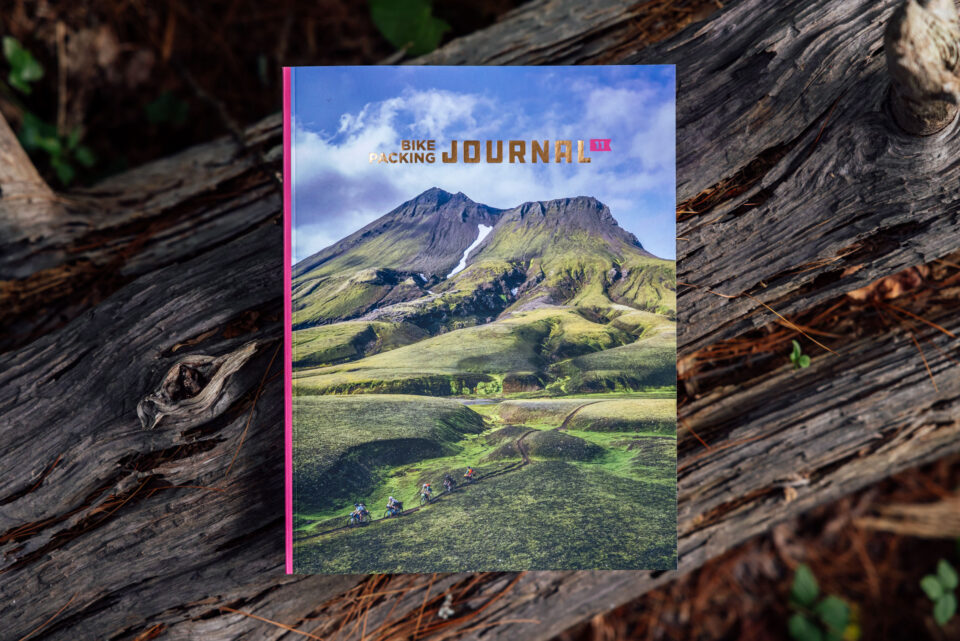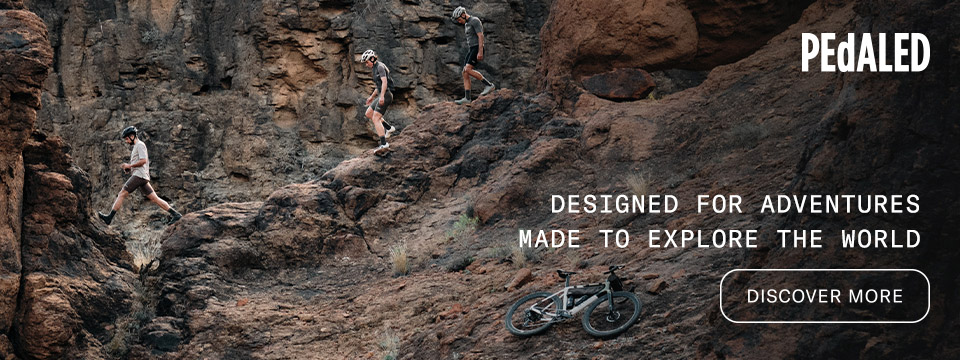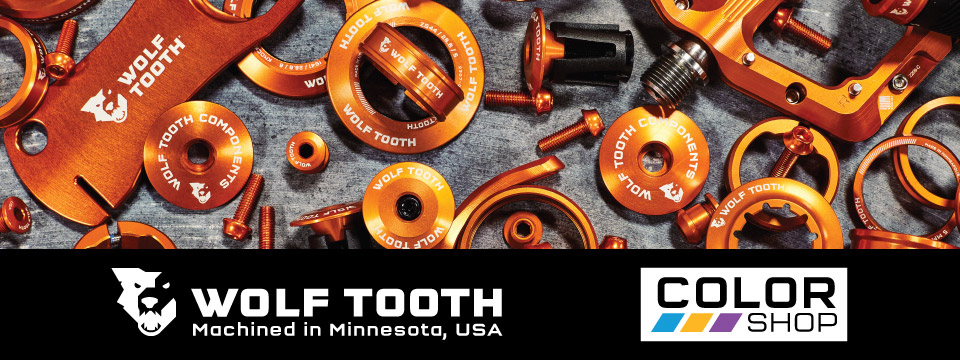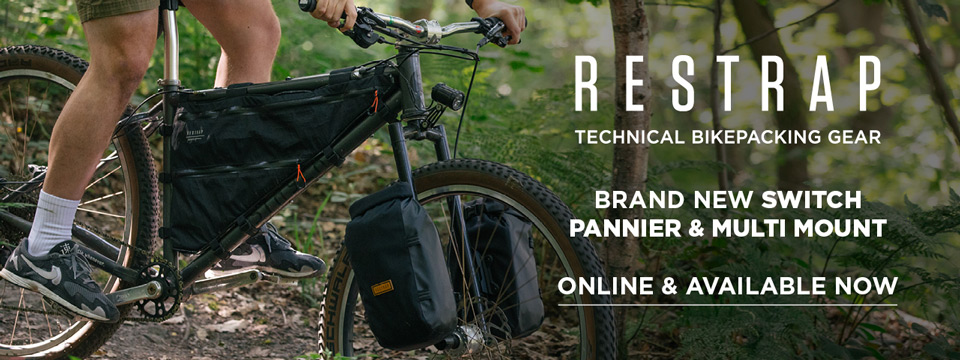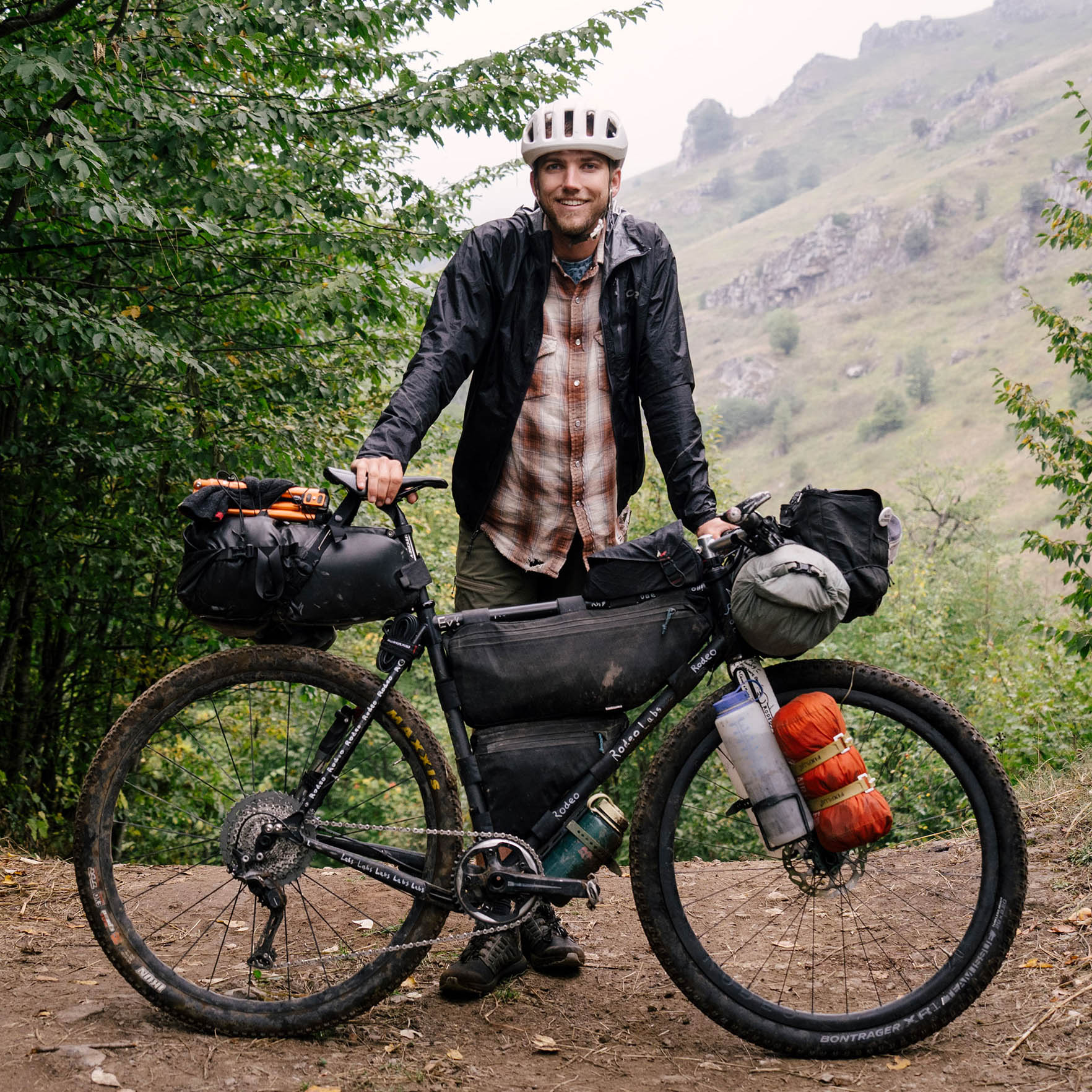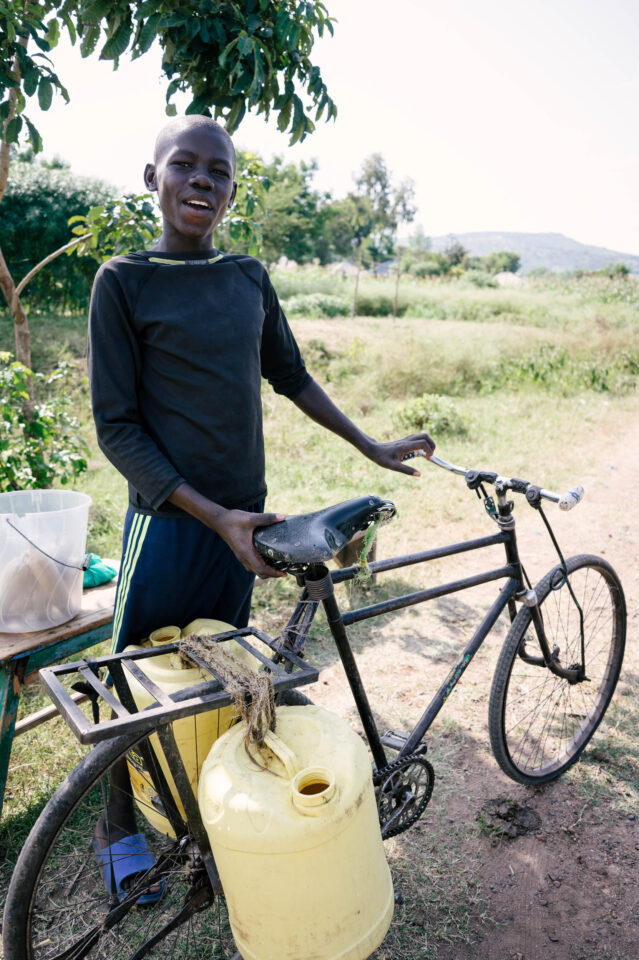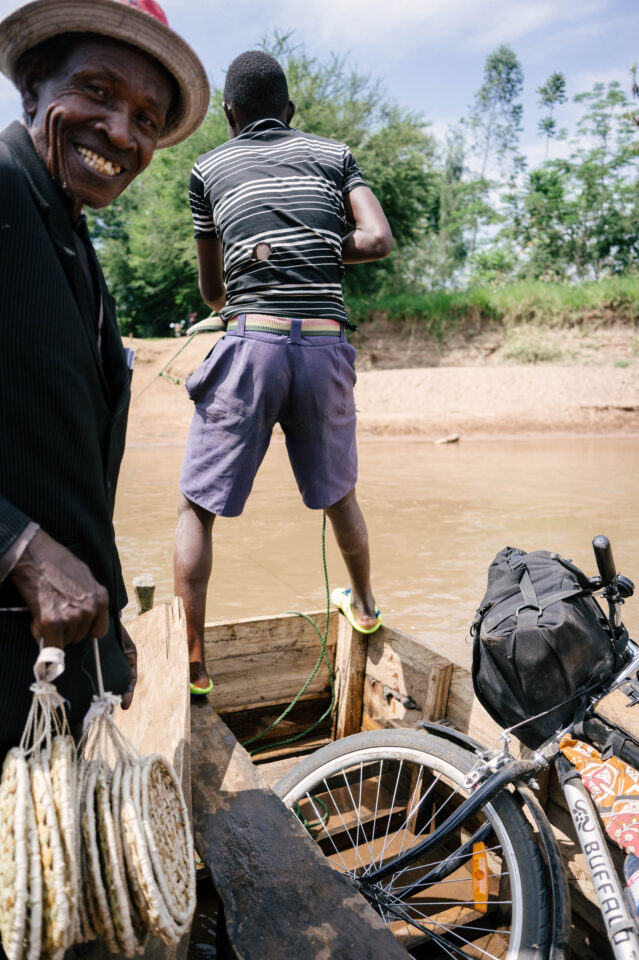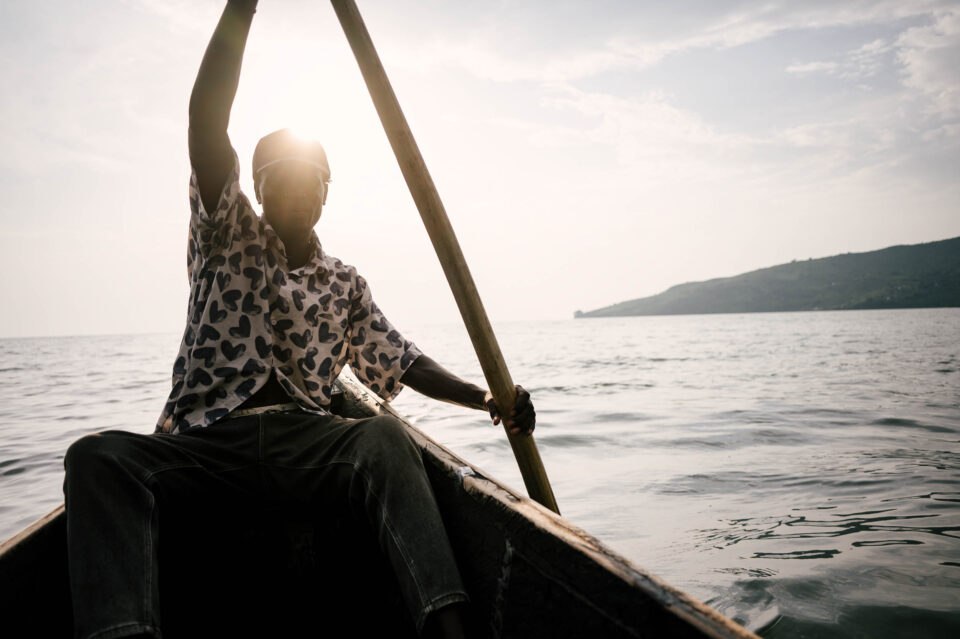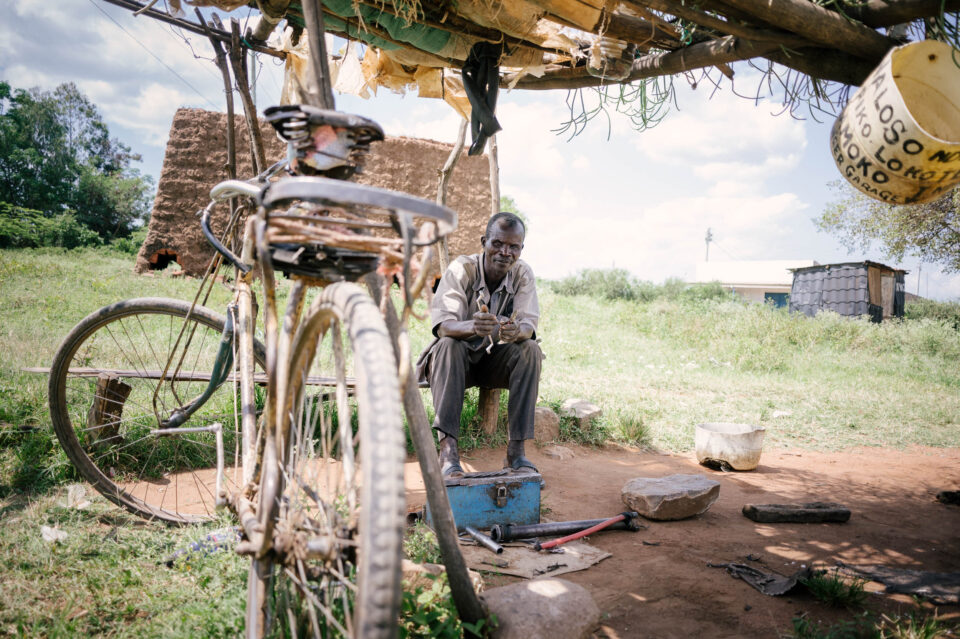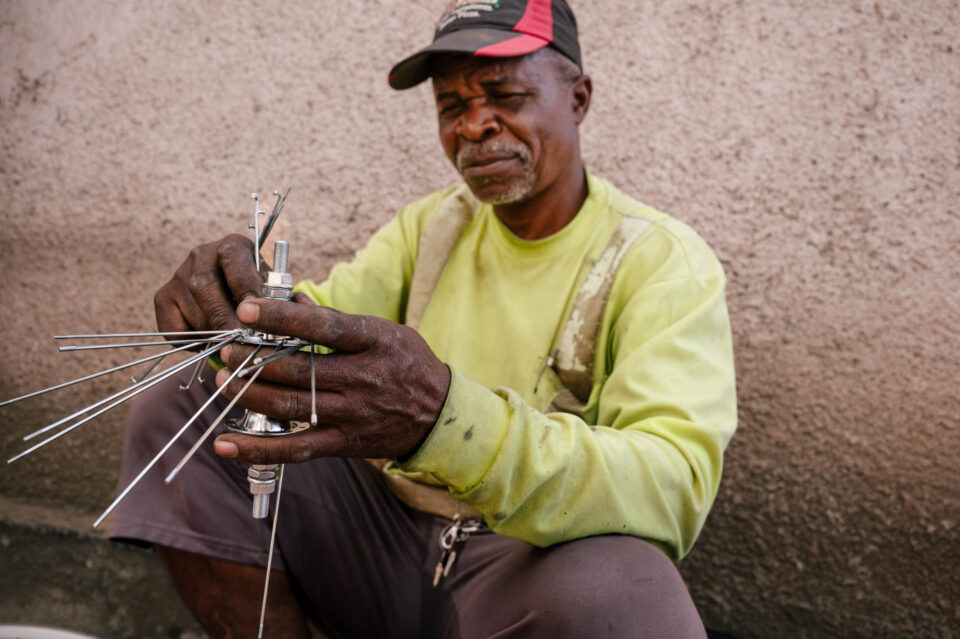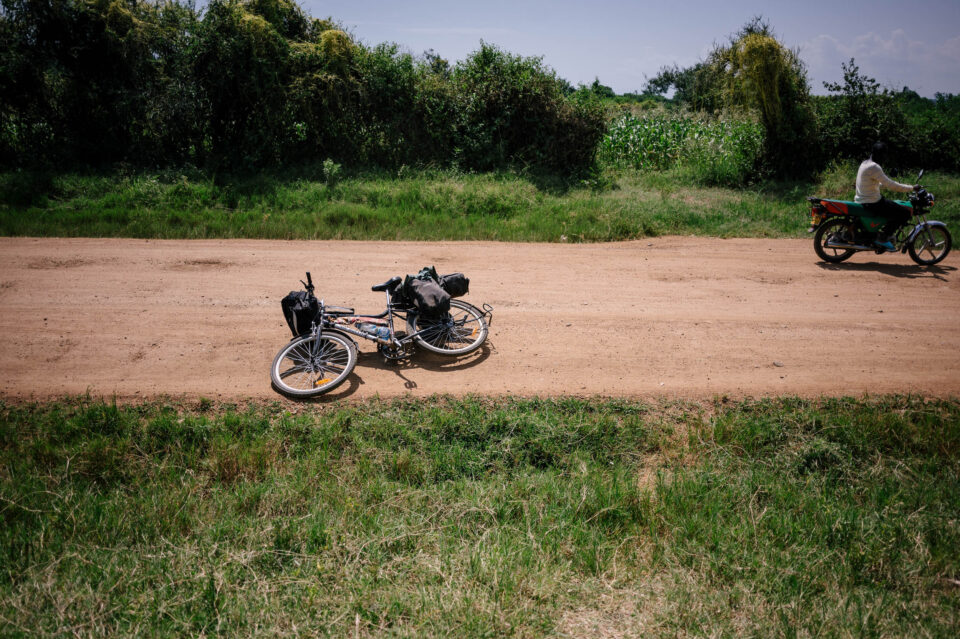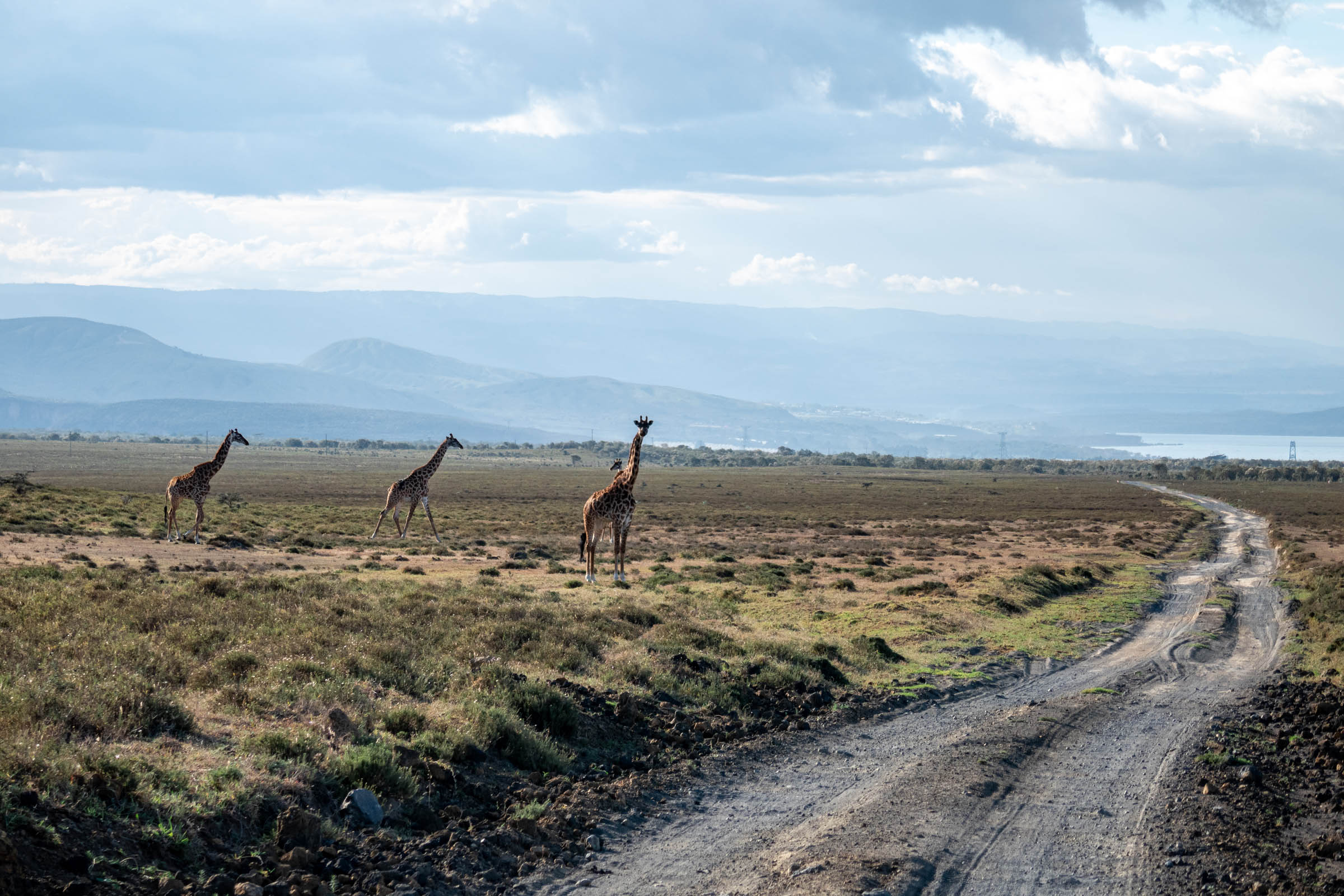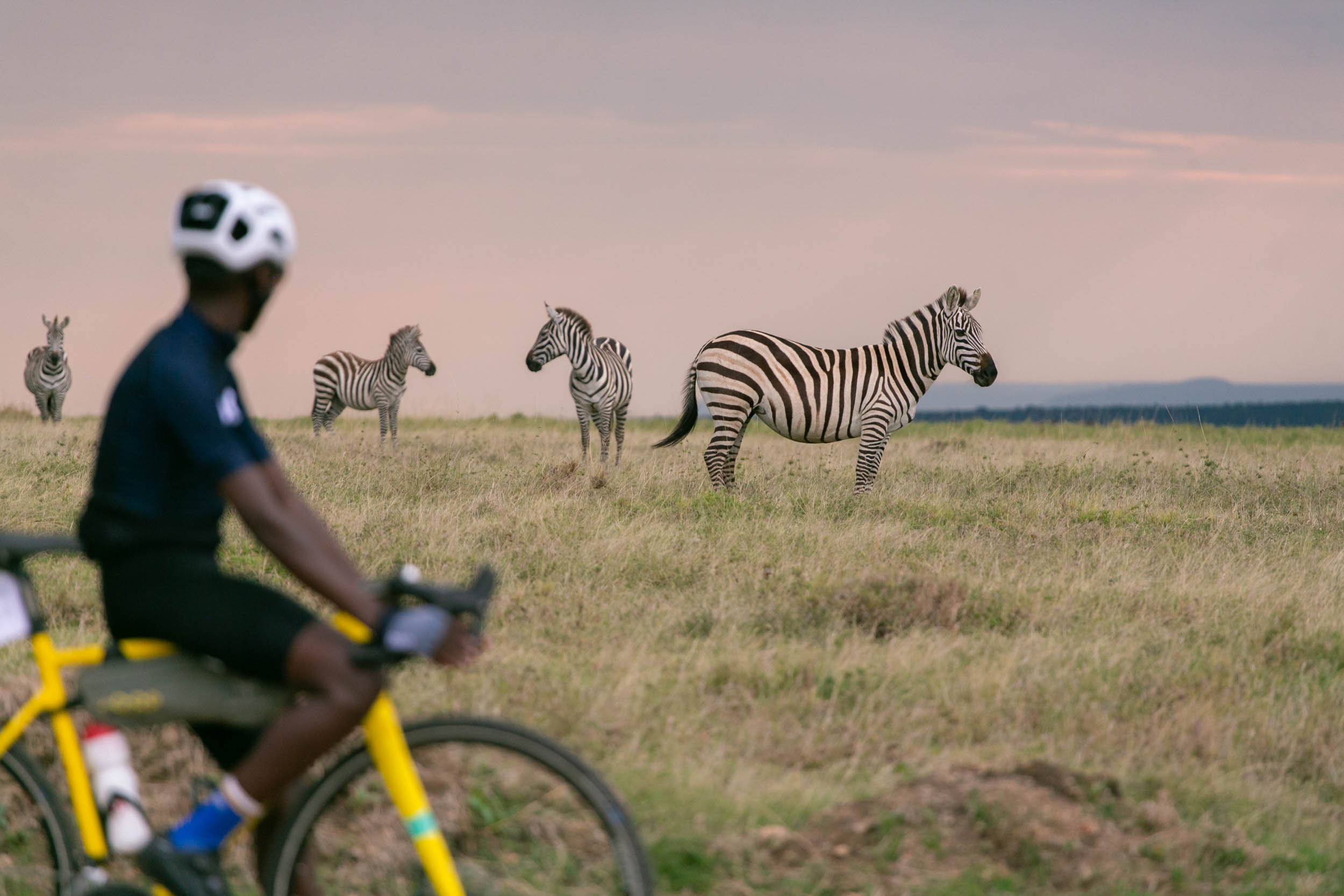Bikepacking on the Buffalo Bicycle
In part two of his series on World Bicycle Relief, Evan Christenson heads out for a bikepacking trip around Kenya and Tanzania on the Buffalo Bicycle. He rides for weeks, meeting characters and contemplating development and the organization’s role in Africa. Click through for his story and another incredible photo gallery…
PUBLISHED Oct 12, 2024
It rides like anything else, the Buffalo Bicycle, with its heavy double-wall rims and small slick tires. It’s carried much more than two panniers and some clothes, I tell myself again as I push off and lose my sandals in the early morning mud. These Buffalo bikes have built homes, built lives, and carried thousands of kids to school on these thick-gauge steel racks. They’ve carried entire forests of wood and charcoal, boats of maize, airplanes full of people for a few pennies.
Me? A dirtbag on a mission, curious and wild-eyed, here and taking the slow way a couple of hundred kilometers down the shores of the venerable and exhausted Lake Victoria. Me? Just another bump in the road to a passing bus, a billboard for sale, and a target for the bored on the roadside. A mzungu in the wild, a man with no home, and a kid with no wit. What am I ultimately to this bicycle? My thoughts race after months of traveling through Africa.
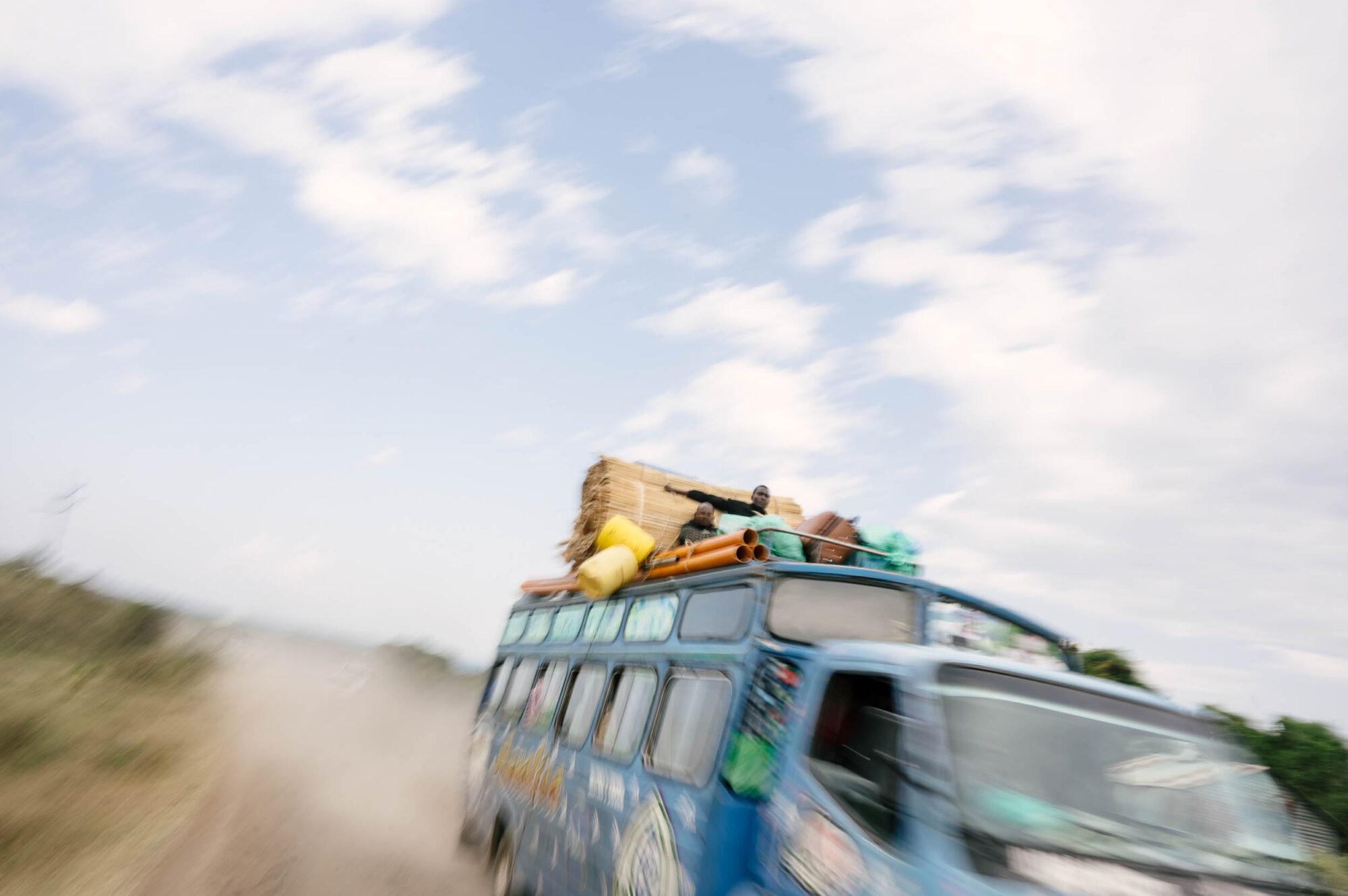
Now, nothing surprises, and nothing makes sense. I set off on the Buffalo bike. I am just one more human being to sit on these rubber saddles. They are sold as UV-stable and built to bear the fierce pangs of this equatorial sun, which still burns my burnt red skin. The saddle is hot as I touch it. It’s still early in the day, and I am already sweating. I will sweat for weeks. I settle into the hot rubber saddle.
I turn left and ride down the highway, the semi-trucks blasting me off the road, the boys yelling, the mud clinging to the tires. I sometimes stop and talk to the people who stop to talk to me, and I sometimes must keep riding. My mind is slipping in this mid-day sun and this endless heckling. For months, I’ve been the outlier. For months, I have felt alien. I stop for a plate of ugali and fish. I drink another Coke. I let a kid ride my bike. I put back in my podcast on development work in Africa. The rumble strips shake me, and the words rattle around. I am not a feather in the breeze. I am a cow in a tornado.

Leaving Kisumu behind, I am humbled, moved, and inspired by the work World Bicycle Relief (WBR) does. But as I ride, I begin to explore the nuance. And I hope you can, too. Please ride with me. Join me on this hot rubber saddle because I am increasingly confused by their place in this world. White men have come to Africa for centuries and done horrible things. More recently, they come to Africa as a way to applaud themselves and alleviate that nagging white man’s burden.

Several prominent African voices I read point to aid work as a narcotic that keeps many Africans dependent and corrupt. And as I leave on the ride, dozens of Kenyans are killed in a violent protest spurred on by a new tax bill aimed at shrinking debt caused by aid money from the West. These African voices, Dipo Faloyin and Dambisa Moyo, say Africa must help Africa. And they must do it themselves. That is the only true and sustainable way past colonialism and into a better future for all Africans. Bicycles are not large binational cash handouts, but where is the line?
I ride, I stop, I look, I ride. I ride, I talk, I listen, I ride. Food, photo, talk, ride. Coffee, water, Coke, beer, water, coffee, Coke, ride. I take a ferry across a spur of the lake and sleep in a cheap guesthouse. It is $5 for the night with breakfast. Breakfast is a hard-boiled egg, white bread, margarine, and tea. I wash my shirt in the sink, and more holes rip when I ring it out. I put on my first layer of sunscreen. I get back on my Buffalo bike. I ring the bell at the children. I begin pedaling again.
World Bicycle Relief gave me the new bike to ride. The S2, it is called. The S2 because it’s a two-by, with two chains and an internally geared rear cog that shifts when you pedal backward. You have two gears now, one for hills and one for flats, although they’re both too tall to be comfortable. The bike is smooth, easy, pretty. It has chrome handlebars and a quill stem. This is not the bike that is donated to kids in schools. That one has steel rims and a coaster brake. One gear. Still too tall. But a great bicycle. The S2 costs 37,000 Kenyan shillings ($286 USD). That’s almost a year’s wage for a lot of people here. Men ask me daily if I can just give it to them. But that’s not how this works.

The SRAM team designed the bike to be easier to work on and more reliable. The pre-existing bikes here, the Black Mamba, have been around for decades and still use that same proven design. They both use thick steel frames, single speeds, burly tires, big racks, and simple brakes. The Buffalo uses a dropped top tube for easier step-over. The Black Mamba uses a bizarre vertical caliper that goes up and into the rim. The connecting rods break constantly, and they’re always repaired with old chains or some solder. It’s funny, picking apart the ingenuity keeping all these bikes on the road. I quickly lose track of how many people I see pedaling barefoot on a naked pedal spindle.
I am on a highway, riding around Lake Victoria. The afternoon breeze builds across the lake, the mid-day sun still burns, and other than a handful as I leave Kisumu, I’m quickly shocked by how few bicycles I see. I was curious to use this ride to dig into local bicycle culture. But three days later, I’ve only seen five people riding. Way fewer than in town. Way fewer than in Tanzania. This area of Kenya is relatively wealthy due to its access to the fishing economy from Lake Victoria. And the sometimes dirt roads and the hills that ruffle out from the water mean the bicycle doesn’t work all that well here.

I slog up hills and rattle back down. I get passed all day. I quickly grow tired. “We work hard. Not like you soft white men, but actually really hard,” one man tells me when I ask where all the bikes are. He’s sitting on one of these cheap, red, Chinese 125cc motorcycles. Another one of the thousands I’ll see this week. “We’ve earned the right to be lazy,” he says. And I take a swig of my warm, flat Coke. I have no more words. I ride on.
As I ride on, it’s a natural question to wonder if the future of Kenya—as it continues to develop and flex its economic muscles—will see bicycles die out. The bicycle is seen as the poor man’s tool. Recreational cycling is growing but still small. And when someone here finally gets the money to buy a motorcycle, they do. Sometimes, people sell land to buy a motorcycle. And a new Buffalo Bicycle is almost the price of a used motorcycle. That’s a hard sale.

“It is too expensive!” one man tells me. Many people, actually. “Far too expensive!” There’s a few cheap rip-offs now of the Buffalo, the Tembo, the Bison, and the Raleigh Urban 3 being my favorites. The same design, same features, same weight. Made in India of probably the same thick-gauge steel. You can buy it new for less than half the price of the Buffalo. And I assume that market will be just fine.
I ride on along the dirt roads tracing the shoreline. I push for hours up small hills. I death grip on the way down. Skids for the kids. Wheelies when I can. This heavy bicycle is just another bicycle. It goes where you want, faster if you push harder. I am alive when we move together. I am independent with my panniers of food and shelter. I go where I want, when I want, how I want. And, of course, when we stop, I am still the white freak.
I was eager to begin this ride into the rural areas of Sub-Saharan Africa on the Buffalo because when I normally ride down here, there is this uncomfortable presentation of privilege whenever I wheel my several thousand dollar, carbon fiber, flashy, fancy bicycle into someone’s mud home for tea and ugali. I feel queasy thinking about how my bike costs more than their home. The financial value of this object I ride could change anyone’s life. So, in riding the Buffalo bike, I was eager to say that this bike is not that expensive. That you can buy it here. That I’m not that much of an outlier. Please don’t treat me differently. Hey look, even my shirt has holes in it!
But that is just half the truth. This bike is still expensive. And more so than that, the ultimate privilege of traveling by bicycle for months in Kenya and Tanzania is the time I have to choose, think, and do this. My Western wages and low overhead mean I can really sit around if I want. I carry a fancy blue passport that grants me hassle-free entry to almost anywhere in the world. When the police say something provoking, I just laugh with them, and we take a selfie, and I go on my way. I’ve been privilege-checked a million times in Africa now. And riding this bike is another million more.

I move where and when I want. I can take whatever turns I choose. I can eat whatever they sell in the next small town and carry whatever with me. This bicycle is heavy, sure, but this bicycle is symbolic of so much more. It carries a lifestyle with more freedom than almost any other in the world. The chrome handlebars reflect this privilege at me whenever I see my whiteness glinting in the equatorial sun. I must squint, for it hurts to look it straight on. And as I aim up more hills and the kids come out to walk with me, I wonder if this bike can help me carry some of this emotional baggage. I put my head down. We embrace our differences. The kids laugh as I do my mzungu dance. We go on.
I stay with a fisherman in a small town when the sun begins to set. He stopped me on the road several hours earlier and asked me to stay the night, and I don’t know where else to go. I wait a bit for him, and when I don’t know where he is, a different man invites me into his home, and we go together up the hill, and his children push my bicycle. Suddenly, the first fisherman shows up on his motorcycle, apologizes for being late, and says, “Come to my house.”
And so I stand on the side of the hill, several hundred kilometers from where I began this ride, still several hundred kilometers to go, many, many thousands of kilometers from my own home, hungry and tired, sweaty and gross, straddling these two choices, debating who to stay with that night, unsure where to go, laughing at the absurdity of this situation. Finally, I elect to stay with the first man because his English is better. We go fishing and canoeing, watch the sunset, walk to the bar, and have a few drinks. We eat fish and ugali with his family, and I try not to gag as I shovel ugali down my throat for the fifth time in two days. The corn powder and water mix sticks in my mouth like roadkill.
The next day, the man is very sad to see me leave. I print some photos for his family as a gift. He asks when I am returning. He asks if I can give him something. He asks what I will do for this town. His posture, his eyes, his inability to watch me leave, it is strange. It is more intense than any I’ve ever experienced. It sits weird in my stomach, though maybe it’s the ugali. And as I leave, I talk to some other people, and they too ask what I’ll do for them. They mention the Italian man who came through here 20 years ago and built a church, a market, and a school. “He made our lives better,” they say. “Now, will you?”
I push off uneasily. Whose responsibility is it to build these schools? Are missionaries helpful in the long run? Where do I fit in here? This town seemed objectively no better off than the others I have been through. But I have to fight my way out of this town. “When are you coming back? Please come back!” I respond half-heartedly. I’m unsure. Will I? Do I have to build schools in Africa? Do I want to?

My grandfather was a Christian missionary, building churches in the Philippines at the height of the Cold War. He spread his civilized religion to the people there. He was a pawn of capitalism in the South Pacific when the US government was terrified of the further spread of communism. He manipulated people without them knowing it so they would side with one faraway power when the time came to choose. They were never consulted, and they were brainwashed. He made them believe in a god he couldn’t get his own grandson to believe in. Yeah, maybe he helped them. Back home, he was always lauded as an adventurous hero. They wrote stories in newspapers about my grandfather. But he also undeniably hurt them: bleaching culture, changing values, and dismissing native beliefs. How did history look back on the colonizers? And the missionaries? What about today?

Dipo Faloyin, Dambisa Moyo, Walter Rodney, and many other African voices on development talk about a culture of dependence that has taken root. And it is here in this small town, bleeding into the soil, bleeding into every conversation. The Italian man made a difference here, undoubtedly. More schools are a good thing. More education is better. But how should those be done? I feel obligated to make the world a better place, too, but I feel nervous about hurting it in the process. And being demanded makes me pedal a bit harder as I ride away. I wonder where World Bicycle Relief fits in. Because why buy a bike if someone soon will give one to me? Why fix mine if there might be a new one next week? What does it mean that I needed relief? What else will the white man give me? At one donation in Kenya, the recipients asked me, not the actual employees, but me, the only white man present, for motorcycles next time.
I ride on, and I’m lulled to exhaustion by the rolling hills and the kids still coming after me. More and more, again and again. It is exciting being the mzungu, being the center of attention, being here in a completely different world. But I am slowly breaking down. I am slowly finding my limits as the pedals keep turning. As the days tick by and I stomach more ugali.
I cross into Tanzania. The border patrol and I share a meal and take a photo together. I push off from the gates, and immediately, it is poorer, less developed, less English-speaking, and the bike count explodes. I go from one or two bikes a day to one or two hundred. People everywhere. Jerry cans and goats and chickens and people on the racks. The Black Mambas roll strong as an ox, heavy, slow, cheap, and everywhere. The backbone of rural African transportation.

Sometimes, in conversation about World Bicycle Relief, Western people say things like “Wow! Bringing bicycles to Africa! I bet they’re really useful there! What a great idea!” And I would just like to clarify that bicycles have existed in Africa for a century now. They have long been an integral tool for people in rural settings for transportation, water collection, economic development, and all that same good stuff. The Black Mamba, derogatorily called a “Bicycle-shaped object” by WBR, has carried millions of people on its back. It’s an old design, and it is slow, but it’s still made new in India and will continue to carry millions of people around Africa.
The hundred or so men who work by riding the bicycle taxis in Kisumu, pedaling around town with a passenger on the rack, 50 cents a mile, slow and steady, are the ultimate professional cyclists. And in Kisumu, a relatively wealthy town, where the WBR warehouse is, where WBR-branded trucks drive by WBR shops, all of them still ride the Black Mamba. When I ask why not the Buffalo, they all say it’s too expensive. Personally, I think the Black Mamba is even more of a miracle. The lore of the Black Mamba is as African as acacia trees and the Masai. It has changed millions of lives. It is not merely a bicycle-shaped object as WBR would like you to believe. It gets kids to school. It carries water home. It costs half the price. It just doesn’t have a communications team behind it.
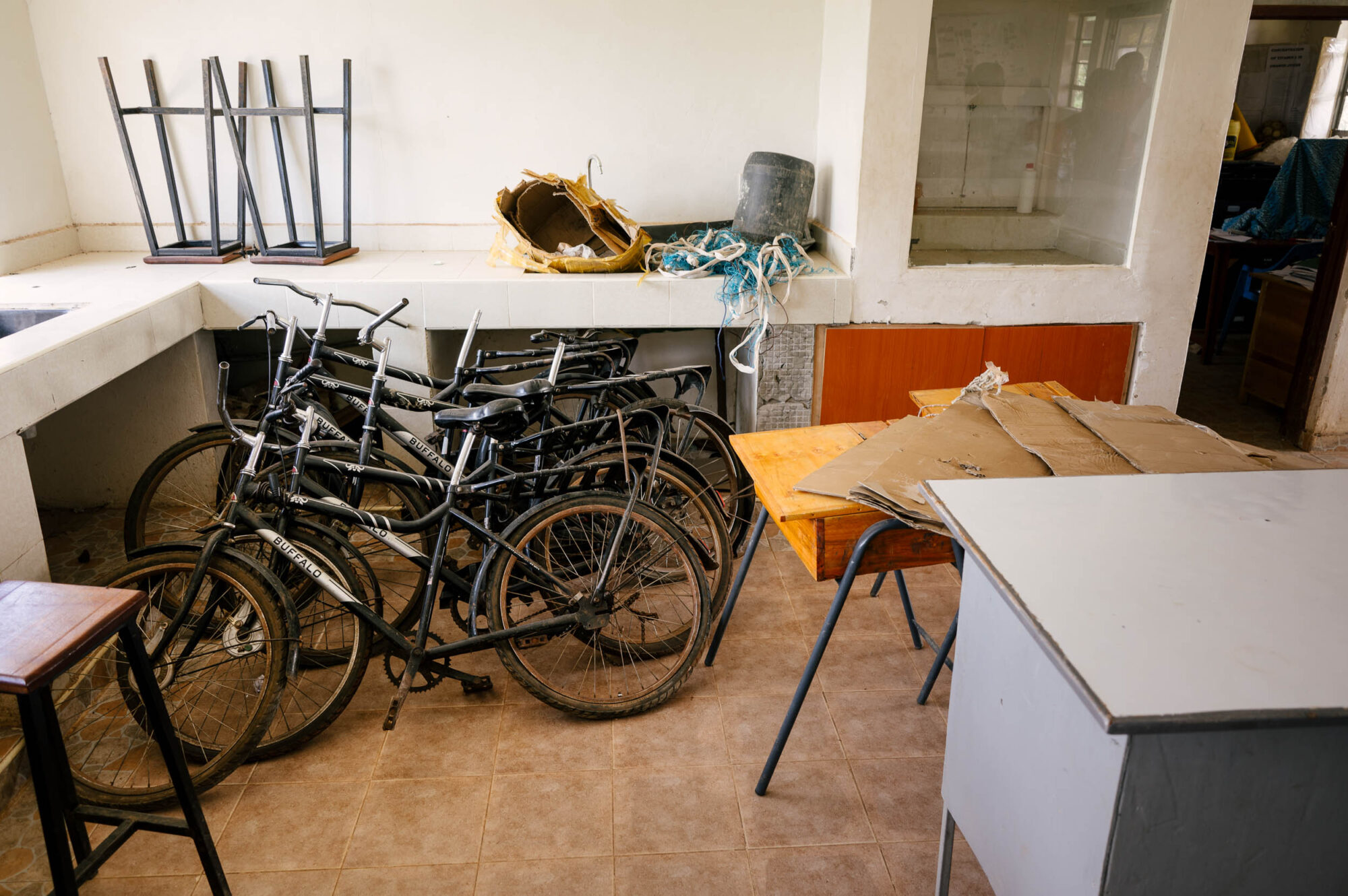
As I ride my first day in Tanzania, I put on a podcast interview with Lance Armstrong and F.K. Day, the founder of World Bicycle Relief. They talk about many things, but Lance asks some silly questions. “Is there even electricity there?” And I would like to clarify that, yes, electricity exists in most of rural Africa. Unreliable, sometimes off-grid with a solar panel and a car battery, but electricity does exist. In towns, it’s everywhere. And when F.K. says he moved to Kenya to work on the project, Lance goes, “Wow! That’s amazing! Are there even houses there? Were you living in like… a grass hut?”
And F.K. Day, the man wearing safari clothing in his TED talk, whom I’m told recently is spending his time flying in private jets from his mansion in Jackson Hole around the world to race cars, does not take this opportunity to educate Lance on what life in Kenya is actually like. Africa will ultimately be stuck in its old tropes and cliches, banished to simple, reductive, racist, repeated, and harmful narratives. And this really bothers me as I ride.
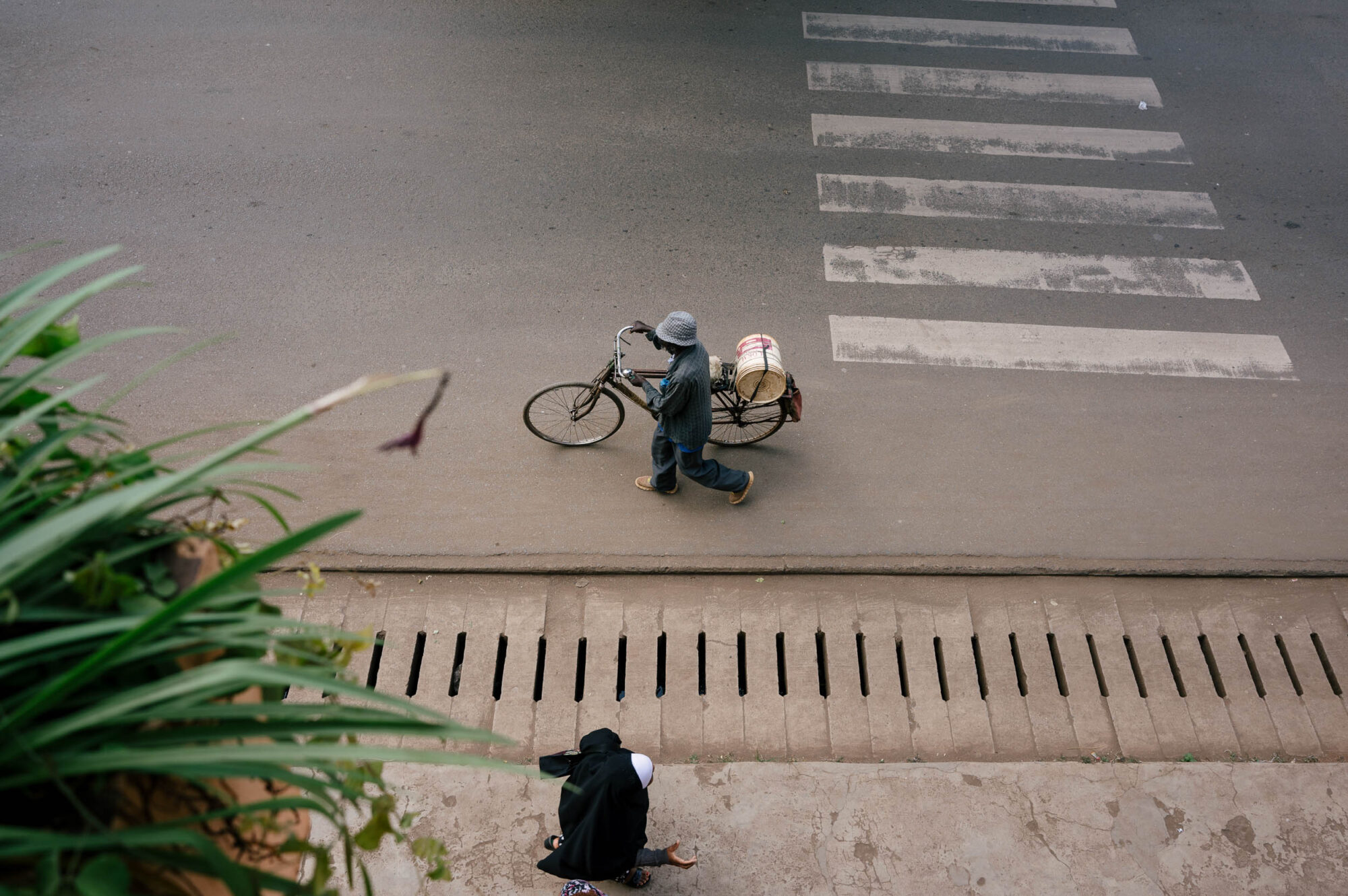
F.K., in fact, lived in a really nice home in Kisumu. And Kisumu is a very nice city, developed and modern. It’s one of the biggest in Kenya. You can buy cold-pressed organic juice and meat alternative burgers in health food stores. There are multi-story, air-conditioned shopping malls with movie theaters. There are fancy cars and several good universities. There is the Acacia, a several-hundred-dollar-a-night, five-star hotel WBR employees stay in when traveling to Kisumu. Kisumu is a nice place to be. I could live there, easily. I loved my time there. But that’s apparently not good enough. F.K. says to Lance, “Oh man. It’s this run-down industrial town. There’s cobras. There’s pythons…”
And to me, maybe a bit too nervous and liberal, flinching at the thought of doing harm, this feels like white saviorism. Manipulating a narrative to make oneself look needed and badass. Calling the bikes there bicycle-shaped objects. Saying Kisumu is just ruins and cobras. Speaking publically about the lives you’ve saved and privately flying a private jet around the world to attend car races amid a climate crisis and contributing indelibly to it while, ultimately, the people you claim to be saving are the same ones most at risk to climate-change-induced drought and food insecurity. A bike won’t help someone outrun the floods, but more rich people in more private jets will definitely make those floods worse.
So, I pedal on. I ride through small towns in rural Tanzania and am scolded for wearing cycling shorts. I eat rice with the sand kicked up from passing construction trucks crunching in my teeth. I drink so much Coca-Cola my pee turns brown. I layer on more sunscreen. I try for more conversation. I do my best. That’s all we can ask from everyone involved. And I ride on.

Several other organizations in sub-Saharan Africa donate bicycles to schools. There’s Co-Op Africa, ABC Impact, and the Village Bicycle Project. World Bicycle Relief is easily the most polished of them all, though. They have excellent branding and in-house storytelling. They send me a packet on how to shoot my photos before I even go to Kenya. They are very well run, and of all the Kenyan groups I hung around, they are easily the best organized. I also heard rumors that one of the other foundations, one where you ship your old bike to them and they donate it to schools, that those bikes are, in fact, just sold in a market. I can confirm for you that the Buffalo bike is real. These schools are real. They’re funneled into these mobilized communities, and these communities have plenty of bikes. The people seem happy. The bikes ride. Life goes on.
But one local bike shop owner I talk to takes offense at the other things WBR says. WBR says the local bike infrastructure is broken, and they need to fix it by building this integrated ecosystem. They say there aren’t spare parts or mechanics to work on the Black Mamba. But every shop I went to had spare parts. And mechanics are everywhere, in the rural parts and even more so in the cities. This bike shop has been around for over 80 years. The owner’s grandfather came from India and started it here on the shore of the lake, a courtyard of rusted-out bikes under the mango trees. This owner says that the Buffalo is too expensive, and the Black Mamba is just as good and half the price. He has every spare part you could need and a dozen mechanics to replace anything. He says it is also wrong for them not to let him sell spare Buffalo parts. They used to let him sell Buffalo bikes and parts, but not anymore, now that they have their own shops. They are trying to run him out of business, he says. They should work more with the already established local businesses rather than build a parallel system from scratch. He feels untrusted, and he thinks that this is wrong. WBR sees it as how it needs to be. When I say WBR calls his bicycles “bicycle-shaped objects,” he’s even more upset.

He sends me a text a week later. I’m almost done with my ride. Two, maybe three days left. I’m exhausted, drained, burnt out, and feeling confused about the whole thing. He asks if I know how much the CEO of World Bicycle Relief gets paid. It’s public information but I haven’t actually thought of this yet. I google it in my nightly guest house, and I don’t know what to do next. According to ProPublica, CEO Dave Neiswander, a former investment banker with no other NGO experience, made $324,914 in 2021. I do some googling and some napkin math, looking at all the other NGOs I know. Because, to me and everyone else I ask, that salary seems ridiculously high. Intuitively, it feels like a lot for a person in the NGO space to be making. And undoubtedly, it is. My napkin math says this. According to ProPublica, as a percentage of annual revenue, WBR’s CEO is paid 28 times the salary/revenue of the CEO of Doctors Without Borders (MSF), 11 times the salary/revenue for the CEO of Mercy Corps, 8 times the salary/revenue for the CEO of World Relief, 37.5 times the salary/revenue for the CEO of the USA Red Cross, 3.9 times the salary/revenue for the CEO of the Mastercard Foundation, and 3.5 times the salary/revenue for the CEO of the Helen Keller Foundation.
And about double the pay for the CEO as a percentage of revenue of Amnesty International and Greenpeace. The only other similar-sized, Northeast US-based, African development NGO I can find, Hope International, their CEO Peter Greer, is making a third as much.

And as I dig around their annual financial reports, in 2021, I see that of their ~$30m of expenses, only $11m is bicycles, and $8m is total salaries. They spend $1.2m on travel alone, and I think back to that fancy hotel and the other ones in the field I couldn’t afford to stay in. I think of the white man in Chicago obviously benefiting the most from this, and I see all the smiling black people on their website, and I sit there alone in my little guest house, and I begin to feel nauseous.
I go to bed. My stomach hurts. It is hot, and I can’t sleep. I wake up in the morning with a fever. I can’t walk. I can’t eat. I’m keeled over, laying in bed, about to faint. Finally, I leave the bike behind. I take a motorcycle to the bus station and a bus a few hours south to a hospital. A few hours later, they put me to sleep and cut out my bursting appendix. I leave the bike behind. I eat fruit salad. I cancel my WBR fundraiser. I sleep for days.
Weeks later, I return for the bike. Time is running out, and I am done. I am conflicted about this entire industry. I am uncomfortable with the rich white man in America getting richer with every bike sold here, sold to someone working their ass off to buy what is promised to them to make their lives better. But I also ride with dozens of people, and I know that it will. This bicycle is powerful, just like every bicycle. They all have the capacity to change the average African’s life. Yours and mine, too. Everyone’s. More bikes are better.
WBR donating so many bikes to rural areas empowers people to live their lives. But their CEO is squandering thousands of bikes into his own pockets every year. And most likely, they create a culture of dependence along the way. But people go to school easier, they are safer, and they can make more money. A human in rural Kenya has more liberty with a bicycle, and sometimes, they cannot afford a Black Mamba. And if that’s the case, they certainly can’t afford a new Buffalo. A bicycle for a poor family is a hand they can grab onto. But that same hand also says that you are poor, you need relief, you need the white man. Where do we all fit into this, I don’t know, reader from Oregon. Is it your responsibility to be giving a bicycle to a child in Kenya? Or is it their parents’? Or President William Ruto of Kenya? Or the United Nations?

So, it’s kind of gross. But it’s beautiful. It’s heavy. But it’s wonderful. It’s the same logic that said 11 speeds was the future. And then 12. Now 13. Soon 14. More. More. More. It’s the American way of doing development work. Loud and inefficient and self-aggrandizing, polished and big money. This is a supercharged V8 going a hundred miles an hour, four miles to the gallon, fire out the exhaust pipes and lead in the foot. Hell yeah, brother. Let’s go fck’n save some Africans.

The United Nations Development Program says, “Human Development is a development paradigm that is about much more than the rise or fall of national incomes. It is about creating an environment in which people can develop their full potential and lead productive, creative lives in accord with their needs and interests. Development is thus about expanding the choices people have to lead lives that they value.” It is about more than giving people cash or about pure economic development. It is about freedom. And giving people bikes is the epitome of that. Life is blissful if we can all do what we want. Aid work is a narcotic keeping Africans dependent. But freedom is the antidote, giving someone the agency to take flight.
I get back on the bike. I feel the freedom as the pedals turn over and the soft onshore breeze laps my face. I wince as I cower over my surgery wounds. The bike is muddy. It is heavy. It is slow. It is still beautiful. This ride has been heavy. It has been enlightening. It has made my world go upside down. It has churned my mind into a vat of boiled goat intestines and brown ugali. I am still that cow in the hurricane, chewing on the Napier grass, looking down at the world below and unsure if I want to return. Two boys on Black Mambas ride up next to me. We trade bikes. The bikes all go when they’re pedaled. They all stop when we want. I fly a bit higher. I will try not to come down.
I make it back to the hospital where my girlfriend is working. I leave the bike with a boy that takes care of the garden. We do not sign a contract. Maybe it’s sold in a few weeks to buy a house. Apparently, that’s what he did with his last one. I lay in my bed after surgery, and I know deep in my heart that I believe in the bicycle as a tool for liberation, for empowerment, for joy, for community building. With WBR, those feelings were only confirmed more deeply. And if you know this too, know that if you give WBR some money, a child will be helped to get to school. But also know that about 60% of that money goes to overhead, and over 2% goes straight into a millionaire CEO’s already very deep pockets. Also, please remember that billionaires are destroying the planet. Every bike is an effective tool. Every bike has the power to change a life. A Black Mamba or a Buffalo or whatever. Yours too. So, go ride your bike. I need a cigarette.
Further Reading
Make sure to dig into these related articles for more info...
Please keep the conversation civil, constructive, and inclusive, or your comment will be removed.



